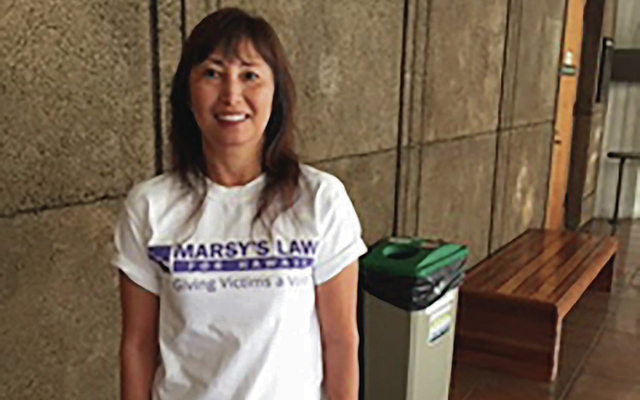A bill that would ensure enforcement of crime victims’ rights as an amendment to the state Constitution remains alive at the Legislature.
Senate Bill 3034, known as the Marsy’s Law for Hawaii bill for its relation to the national Marsy’s Law victims rights initiative, would amend the Constitution to establish the right of crime victims or their immediate surviving family to be informed of major developments in the case, the final disposition of a case, and when the accused person is released from custody; to have their safety considered in fixing the amount of bail and release conditions for the accused; to be provided with information regarding financial assistance or other services available to victims; and to be notified of all public court proceedings relating to their case.
“This bill is so important because it requires that victims be informed of their rights and it guarantees that they’ll be enforced.” – Iris Kauhane, domestic assault victim
It would further give victims the right to provide information to a probation official conducting a pre-sentence investigation into the impact of the offense on the victim or surviving family, and any sentencing recommendations before the defendant’s sentencing.
Hawaii is one of 18 states that has not adopted such rights as constitutional guarantees.
A limited set of victim’s rights is included in the Hawaii Revised Statutes. However, as Marsy’s Law in Hawaii Executive Director Stacy Evensen said, enforcement is left to individual counties and it is not uncommon for victims or their surviving families to be denied their full rights — if they are even aware of them.
“As a constitutional amendment, these rights would be permanent and enforceable,” Evensen said.
The bill unanimously passed the state House Judiciary Committee and is with the House Finance Committee. If the Legislature passes the bill, voters would decide the issue in the November general election.
The measure has received broad support from victims’ advocacy groups and other community and governmental agencies.
During the House Judiciary Committee hearing March 15, several victims of domestic abuse and other crimes offered poignant testimony in support of the measure.
Nonohe Botelho, Hawaii contact person for the National Organization of Parents of Murdered Children, spoke of the “life sentence” she has served since her son, Joel, was shot to death outside the family’s Kaneohe home.
“I will be connected to my son’s murderer for the rest of my life,” Botelho said. “This is not something I chose for myself. The defendant took my choice away the minute he shot and killed my son.”
Yet, while both the defendant and the victim’s family are made to walk through the judicial process, Botelho said their rights are not equally protected. She noted that while protecting the defendant’s constitutional rights is what drives the justice system, victims seeking legal remedy have to submit a written request.
“And even upon written request, there is nothing in the current (statutes) that compels or imposes action in favor of victims and their families,” she said. “The same constitutional rights that protect defendants also serve to keep victims silenced.”
Elke Gillooly, a social work student, told the committee how she had been repeatedly assaulted over a five-year period, starting at age 5, and how she suffered in the aftermath, surviving three suicide attempts.
“Once my attacker was arrested, he was afforded all the rights provided to him by our legal system,” Gillooly said. “My rights were taken away. I was essentially murdered at age 5. The woman I was supposed to be never happened.”
Among those testifying in opposition to the measure was Kat Brady, coordinator of the Community Alliance on Prisons, who said she supported the goal of addressing victims’ needs but believed the measure is “rife with unintended consequences,” among them the potential for a trial to be unduly influenced by a victim’s appeal, and the possibility that additional actions required by the law could potentially obstruct a defendant’s right to a speedy trial.
While supporting the measure, Deputy Attorney General Lance Goto also expressed concerns that notification provisions applied to misdemeanor and petty misdemeanor cases could interfere with plea deals, which are often quickly negotiated and entered at a suspect’s initial court appearance, and exacerbate existing backlogs in district courts.
After the hearing, 57-year-old Iris Kauhane of Kaneohe reflected on the ways in which Marsy’s Law might have helped her when she was the victim of a domestic assault in 2011.
Kauhane said she was largely unaware of her rights as a victim, even as her ex-husband and his private attorney manipulated the system. She recalled how her husband requested a jury trial, knowing that the backlogged court schedule could not accommodate one within the six-month period allowed for him to receive a speedy trial. She shook her head at how his felony charge was thus thrown out and how he was able to retain his extensive firearms collection.
Kauhane’s smartphone still contains angry text messages her husband sent her after he was arrested.
“I didn’t know what my rights were,” she said. “I didn’t even know that he wasn’t supposed to be texting me — he could have been charged for that. This bill is so important because it requires that victims be informed of their rights and it guarantees that they’ll be enforced. That would have made a big difference.”
Marsy Nicholas, for whom the law is named, was a senior at the Universtiy of California at Santa Barbara who was stalked and murdered by her ex-boyfriend in 1983.

